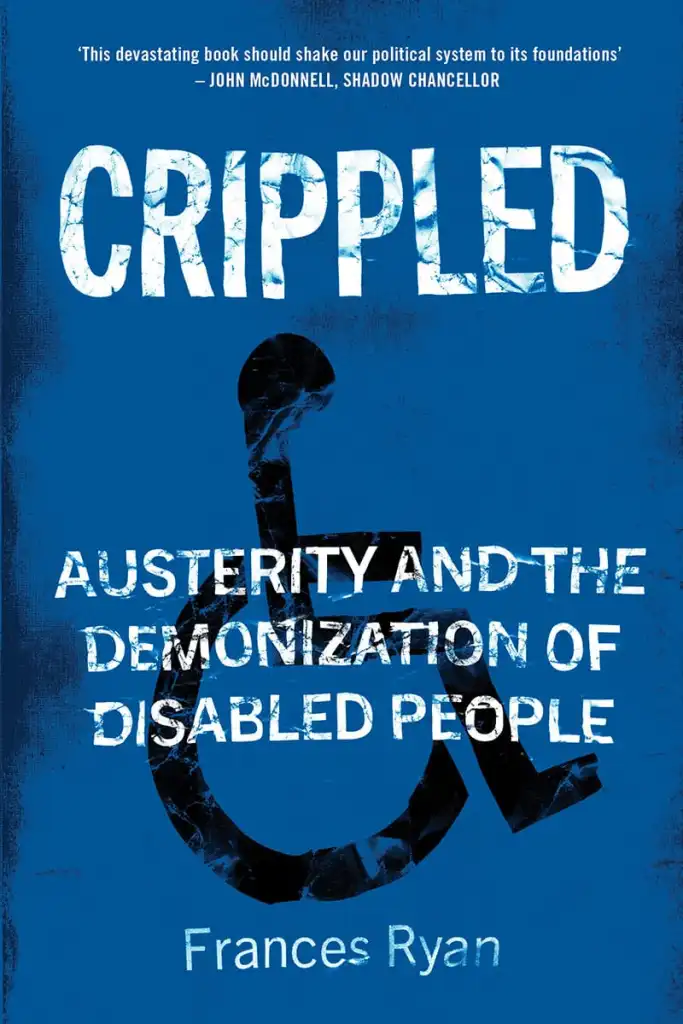Austerity & disabled people in the UK: Q&A with Frances Ryan

Dr. Frances Ryan is a journalist, broadcaster and author. Her weekly Guardian column, Hardworking Britain, has been at the forefront of coverage of austerity this decade. Ryan was highly commended Specialist Journalist of the Year at the 2019 National Press Awards for her work on disability, as well as shortlisted for the Orwell Prize 2019 for Exposing Britain’s Social Evils. Her first book, Crippled: Austerity and the Demonisation of Disabled People, was published by Verso this summer. Twitter: @DrFrancesRyan. Photograph: Fabio De Paola/Fig Tree
Alice Wong, Disability Visibilty Project July 31, 2019
| Tell me a little about yourself! |
Frances: I’m a journalist and wheelchair user based in Nottingham, England. I write a weekly column for the U.K. Guardian, typically about disability, poverty, education and all types of inequality. And also TV when they let me.
| For people outside of the UK who are unfamiliar with the impact of austerity measures on poor and disabled people, can you give a brief overview of what’s been happening in the last few years? |
Frances: Britain doesn’t have a perfect record of disability rights but for decades, we’ve had a strong welfare state that’s given disabled people a real safety net: from the NHS, benefits to pay for the extra costs of disability, to increasing support for the right to live independently.
In recent years, we’ve seen this progress be rolled back. Post-2008’s global economic crash, Britain’s right wing government adopted some of Europe’s harshest austerity measures and it was disabled people who took the greatest hit: last month, research commissioned by the Disability Benefit Consortium, a coalition of over 80 UK disability organisations, found changes to the social security system over the past decade have left disabled adults four times worse off financially than non-disabled adults.
| At what point in your observation and reporting on this subject did you feel that a book is necessary on this subject? |
Frances: I started to report on the cuts in 2012 as the first measures came in and it was quickly apparent to me that this was really significant. Each time I reported on a new policy, I would get emails, tweets, even hand written letters from disabled people detailing how their lives were changing for the worse: their social security had been removed so they can’t afford regular meals anymore, or their social care had been cut and they no longer had an assistant to help them get to the toilet.
These issues couldn’t be more pressing, I think – and not just in the U.K. The Trump administration’s attempt to cut back support for disabled people in the US shows these are global issues facing the disabled community.
| What are some major themes you want readers to come away with after reading Crippled: Austerity and the Demonisation of Disabled People? |
 Frances: Societies often tell themselves a certain narrative – namely that we are fair and compassionate – but if you press further, how Britain or the US treats disabled people (or other marginalised groups) is typically more troubled. I wanted to ask difficult questions. How are we really treating disabled people? Why? And what does this mean about what sort of society we are?
Frances: Societies often tell themselves a certain narrative – namely that we are fair and compassionate – but if you press further, how Britain or the US treats disabled people (or other marginalised groups) is typically more troubled. I wanted to ask difficult questions. How are we really treating disabled people? Why? And what does this mean about what sort of society we are?
I also wanted to really challenge cultural perceptions and prejudice towards disabled people, and look at how that plays into public policy. At its most hostile, the idea disabled people are ‘scroungers’ and burdens on the so-called taxpayer is a narrative that has huge impact on us. But I also wanted to skewer well meaning narratives too, like the idea disabled people should only be ‘looked after’ because we are ‘vulnerable’. Disabled people, of course, aren’t inherently vulnerable – we only become vulnerable when the structures that enable us to live fulfilled, safe, dignified lives are pulled away by the state. I wanted to argue that these attitudes – whether toxic or seemingly benevolent – don’t exist harmlessly in a vacuum but are directly related to how willing non-disabled people are to see state programmes for disabled people destroyed.
| You mentioned in your acknowledgments that your own disability took a downturn during the writing of this book–what was the experience like writing it, working with editors, and trying to stay alive at the same time? |
Frances: I became ill with flu complications half way through writing the book which hugely impacted by disability – quite an irony considering the topic of the book! I think many disabled or chronically ill people know how health can get in the way of life, and how you just find your way out of it the best you can. For me, it was my publisher pushing back the publication date of the book and then doing it bit by bit: writing an hour a day and getting there slowly.
I’m a pretty private person. But I talk about this sometimes because I hope it’s valuable to others to hear fellow disabled people being open about things. It can be hard, I think, to see just the end product, like a book launch, or a social media idealised version. I hope being honest about it is helpful for some people going through a tough find themselves.
| As disabled people, you and I know the experience of cuts in the welfare state and becoming the Other. What kinds of changes, both culturally and politically, needs to take place to push back against ableist narratives, institutions, and forces that scapegoat us? |
Frances: When governments cut the safety net, they don’t only demolish funding for the welfare state but also the principles behind it. Too often, it is now viewed as a draining cost to keep down rather than a world-class strategy to provide security in our times of need. As campaigners, we have to continually make that case – that the safety net is there to protect us all when we need it, and it will be a horrendous loss to society if it’s fully gone.
I think we also need to look to representation, in culture as well as politics. It’s our right to be included but it’s also beneficial – a non-disabled person is much more likely to empathize with a disabled person who’s had their social security cut if they’ve grown up surrounded by positive, everyday versions of disability – be it on-screen, in the media or at school or the office.
| What’s your take on a post-Brexit UK and the state of disabled people? If things will become worse, what are some examples you imagine might happen? |
Frances: I think this is a really scary time for a lot of people right now, and Boris Johnson becoming Prime Minister in the last few weeks has only heightened that feeling.
We need to be really careful when talking about it not to heighten fears but at the same time, we have to speak openly about it. The threat of a no-deal is particularly worrying. A few months ago, my colleague Sarah Marsh and I had a front page story highlighting how some people were stockpiling medications out of concerns a no-deal would threaten supplies.
If a recession hits, disabled and low income families are always the first to suffer as prices rise and economies shrink, particularly if further cuts are introduced. Disabled people have been largely shut out of the Brexit discourse so we definitely need to push to keep us and our interests in the picture.
| I first started reading your work in The Guardian and have been so impressed that you are one of their columnists and that you report regularly on disability issues. How did that come about and why is it important that disabled reporters have platforms like your column and book? |
Frances: I’d always written in my spare time but started to freelance whilst finishing my PhD. In 2012, I took part in the Guardian’s Positive Action Scheme for disabled people, which really helped me meet editors and others in the industry. They run this every summer in their London office, along with one for BAME [Black, Asian and Minority Ethnic] writers, so look out for applications online.
Things are improving but the media is still largely white, male, wealthy, and non-disabled. Making newsrooms representative is only ever going to make them stronger; it brings in talent currently being ignored and helps ensure coverage reflects wider society. We need disabled people to be in a position to tell our own stories – now more than ever.
Source Disability Visibilty Project
Also see
‘Electrifying’ book about women with disabilities sells for six figures The Guardian
Changing the narrative on disability: is representation in books getting better? The Guardian
Crippled by Frances Ryan review – how disabled people have been demonised The Guardian






